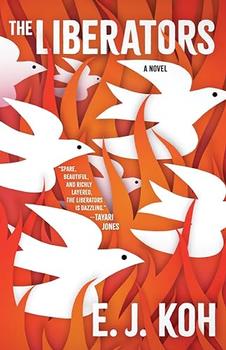Summary | Excerpt | Reviews | Beyond the Book | Readalikes | Genres & Themes | Author Bio

Yohan
Daejeon, 1980
By an early age, I could read and write in six languages. I found a tool—an ink brush, a twig, or my stub finger—and used it to draw a character on parchment, dirt, or air. When one line touched another, my heart reached my fingertips to impart meaning. At five, it was for pleasure that I left words all over town: on a tree, I carved tree; in the river, I spelled river in pebbles; on my mother's dress, I inked dress. At some point, my mother set me down and didn't pick me up again. On my mother's grave, I wrote grave. I was just a boy at the end of Japanese colonial rule. I wrote my words as if I couldn't live without them, as if I were made of nothing but words. I classed rock, plant, animal, man, and God. I observed a patch of weeds and then myself in the mirror to see the differences between plant and man. Between them was a middle point, or animal. I asked what stood between man and God, but the grave said nothing. I watched the country divided up as spoils of war. When I was fifteen, I was taken in for vandalism and sent to the military. I labeled my boots boots, and my gun gun. I spelled fire with sticks, lit it up in flames. Penned grenade, pulled the ring. My last words I wrote on the side of an ICU tent, filled with my dismembered comrades, in the blood I owed them: death, death, death.
After my years in the military, I was made of silence. I carried out my duties quickly and without protest. Peeled out the bunks, torn and stiff, and myself, thirsty and whiskered, I worked the sprawl, search, and rescue; leashed the dogs; unspooled rope; baked bodies; collected resin for fuel tanks; plunged drills down holes; poked at slugs with my rifle. One day the older recruits marched me to the showers and told me to get prim. I accepted two medals for protecting foreign dignitaries. My director and department were shocked to hear I wanted to retire to a lowly auditor at the age of twenty-four. They were puzzled by my decision, but after a roomful of handshakes, after I'd surrendered my clothes for the next soldier, my leaky and clouded binoculars, and a tin of hand-rolled cigarettes, I was installed in Daejeon as the youngest superior at the office. I so assumed my position nobody called me again.
I never asked what wonders I might have been capable of had I been left as the boy filled with words, or whether foreign dignitaries might have come from across the ocean to witness how I read and wrote throughout fall, winter, spring, and summer. I pictured my mother outside my room, telling visitors not to wake me since I needed my rest, and myself, stirring up with a smile before I snug-gled back into the covers. I didn't regret that she had died before the surrender since she had not lived to see the war. Rather than words—using them whenever it snowed or rained or blossomed or the sun touched me on my way to the office—I grew skilled in courting. It didn't come easy, but I understood courting fundamentally. Courting was forcing a thing to become unlike itself. I had become removed from my own nature. So I married and had a daughter. I changed the structure of myself—an animal into a man—to love my wife. Then only life could change what God intended to be human into an animal, even into a plant, vulnerable to the crush of a heel or an aneurysm. To replace a rock in the ground with my wife, then my wife with a gravestone on the surface.
* * *
One morning in 1980, I was in my midforties, when I picked up the phone and called my employee. At twenty-three, my daughter was one of few unmatched girls her age, and my employee had two sons who wanted to build airplanes. His sons sketched planes on their napkins. A perfect tea set of aeronautical engineers. I rang from the guest room on the first floor, my late wife's room. The windows overlooked the steps to the entrance where tall iron gates jostled in the wind. The fog drew rosefinches, like blooms in the low bush, whose cries I mistook for rainfall. On the news, threats loomed—they argued about the North Korean underground tunnels. The third tunnel had been found some years earlier, less than thirty miles from the capital. Tunnels ignited fears about spies hiding among us. GIs left their bases and camptown brothels, in such numbers since the war, and arrived with the trains' pipe-organ whistles.
Excerpted from The Liberators by E.J. Koh. Copyright © 2023 by E.J. Koh. Excerpted by permission of Tin House Books. All rights reserved. No part of this excerpt may be reproduced or reprinted without permission in writing from the publisher.




Fanaticism consists in redoubling your effort when you have forgotten your aim
Click Here to find out who said this, as well as discovering other famous literary quotes!
Your guide toexceptional books
BookBrowse seeks out and recommends the best in contemporary fiction and nonfiction—books that not only engage and entertain but also deepen our understanding of ourselves and the world around us.